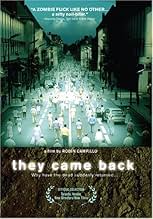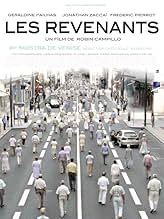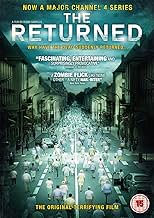CALIFICACIÓN DE IMDb
5.8/10
3 k
TU CALIFICACIÓN
En un pequeño pueblo francés, los residentes enfrentan el regreso de miles de personas recientemente fallecidas, desafiándolos a reintegrar a estos antiguos muertos en una sociedad que ha co... Leer todoEn un pequeño pueblo francés, los residentes enfrentan el regreso de miles de personas recientemente fallecidas, desafiándolos a reintegrar a estos antiguos muertos en una sociedad que ha continuado sin ellos.En un pequeño pueblo francés, los residentes enfrentan el regreso de miles de personas recientemente fallecidas, desafiándolos a reintegrar a estos antiguos muertos en una sociedad que ha continuado sin ellos.
- Dirección
- Guionistas
- Elenco
- Premios
- 2 premios ganados y 5 nominaciones en total
- Dirección
- Guionistas
- Todo el elenco y el equipo
- Producción, taquilla y más en IMDbPro
Opiniones destacadas
Let's get this out of the way first: I watched this because I'm obsessive about the wonderful French TV series of the same name, and in the absence of the never-to-be-made season 3 this seemed worth a try to alleviate my withdrawal symptoms!
And I was not disappointed. It's not a patch on the outstanding TV show (but then what is?). However it is a haunting, thought-provoking slow burner which is, ultimately, a melancholy meditation on love, grief and the meaning of human identity.
And we should be very, very grateful to this movie for inspiring the kind of gentle, confused, almost human zombie that eventually gave us those unmissable two seasons of TV.
And I was not disappointed. It's not a patch on the outstanding TV show (but then what is?). However it is a haunting, thought-provoking slow burner which is, ultimately, a melancholy meditation on love, grief and the meaning of human identity.
And we should be very, very grateful to this movie for inspiring the kind of gentle, confused, almost human zombie that eventually gave us those unmissable two seasons of TV.
Four and a half thousand years ago, the Sumerian civilization existed in the land we now call Iraq. In a surviving work of their literature, deciphered from a baked clay tablet, we learn that their goddess of love, named Inanna (who was called Ishtar by the later Babylonians), threatened to go down to the Underworld and smash the doors, saying: 'And all the dead will get out, and they will outnumber the living.' This ancient fear of our species, explicitly documented circa 2500 BC but really extending throughout the entire history of mankind, is explored in this strange and eerie French film, which has now inspired a popular French television series of the same original title and theme. This film is entitled in French LES REVENANTS, which means THE RETURNED, and that is the title used now on the DVD release with English subtitles, though the cinema release with subtitles a few years ago was as THEY CAME BACK, a title which has now been abandoned, so that the continuity may be clear to purchasers that this is the basis of the TV series, which is making a hit. Essentially, this is a film about zombies, but it is not at all a horror film, and none of them stagger around making gormless noises and bashing people. Nor are they comical, in the hysterically funny mode of SHAUN OF THE DEAD with Simon Pegg (2004, see my review), which by strange coincidence came out in the same year as this film, for this film portrays zombies very seriously and thoughtfully, and is as far from being a comedy as you can get. The study of the 'returned dead' is extremely sophisticated. One day, without explanation, large numbers of recently dead people are seen walking from the cemetery back into a provincial French town. They are all physically fit but rather dazed and uncommunicative. In this town alone, 13,000 of them suddenly appear, having left their graves. They are not at all threatening, but are quiet and reserved and, somewhat ominously, all seem to have an understanding with one another. We are told that millions of 'returned dead' have appeared all over France, and some satire creeps into the film here, because meetings are held in which various politically correct people insist that the human rights of these dead people must be respected, they must all have their old jobs back, and their pensions must be reinstated. Most of them are elderly, but there are a few younger ones and children. Extensive bureaucracy then grinds into slow motion, as the returnees are identified and kept in a compound, sleeping on bunks before being reunited with their families. But then it is noticed that they are not sleeping, but merely pretending to sleep. It is also noticed that their body temperatures are all five degrees lower than normal. They are hyper-active and begin to have secret meetings at night while 'living humans' are asleep. They become increasingly restless and seem continually to want to flee, but it is not clear to where they wish to flee. They have mostly lost their memories, which come back to them slowly, although they are perfectly capable of speaking fluently when they need to, and of carrying out any daily tasks. They remember where they used to live and recognise their family members. But they appear to be incapable of relating to any living person emotionally, or having any feelings. Hence, there are no tearful reunions and desperate huggings. They are distant, and the living humans are made very uncomfortable by their presence, so that many people refuse to see the returned dead whom they had once loved. This is a very strange film indeed, very much under-stated, and hence all the more effective for that reason. This wonderfully evocative and mysterious film was the first film directed by Robin Campillo, and it was an impressive debut, done with great skill. He has just completed his second film, EASTERN BOYS (2013), which is apparently not yet released. Campillo also wrote this film, jointly with Brigitte Tijou. It is no wonder that this provocative and disturbing examination of one of our deepest fears has inspired a television series, for it is easy to think of endless episodes in which further and further layers of mystery are peeled away from this nearly inexhaustible subject. After all, the subject of zombies is never really dead, even though they themselves are.
This film stirs a few emotional quandaries, many of which a viewer may choose not to explore. If the purpose of film is to generate thought and reflection as much as to entertain, 'Les Revenants' succeeds by virtue of it's creepy essence and the personal and social problems we'd encounter as individuals if faced with the reality of having our dead loved ones come back to us. The subject is handled cleverly and touchingly by the director who never attempts to drive our view but allows the characters to help us define our feelings. Particularly perplexing for a parent who might give just about anything to see their fallen child again. The misty night scenes, serene almost drugged manner with which the dead carry themselves and the evolution of divided feelings regarding their return by the living give the film an ethereal pace which may disappoint flesh hungry zombie fans.
Well, anyone who's been to a 'zombie' movie knows that nothing good can come from bringing the dead back to life, but director Robin Campillo presents a more interesting dilemma. How would a society accommodate and re-integrate their loved ones and relatives if they suddenly came walking out of the cemetery with clean clothes, no illnesses, and energy to spare.
What director Campillo has done is replaced 'scary' with 'eerie' as a local government struggles to shelter and re-located hundreds of the town's former inhabitants. In addition, the town's mayor must decide whether people can return to their old jobs, their old lives, or whether they should be studied to determine how all this came about.
Film takes a very matter-of-fact approach to sifting through a population influx, much like having a large group of refugees arrive in your town. The local scientists do make some early discoveries involving reduced sleep patterns, lower body, temperature, and how these 'arrivals' may only be acting normal as memory response.
If you enjoyed last year's "Time Out" (which Campillo co-wrote), then you'll also appreciate this spooky, but 'non-flesh eating', dead people coming back to life cinema experience. In some ways having your ex-wife come back can be scarier than a zombie, eh guys?
What director Campillo has done is replaced 'scary' with 'eerie' as a local government struggles to shelter and re-located hundreds of the town's former inhabitants. In addition, the town's mayor must decide whether people can return to their old jobs, their old lives, or whether they should be studied to determine how all this came about.
Film takes a very matter-of-fact approach to sifting through a population influx, much like having a large group of refugees arrive in your town. The local scientists do make some early discoveries involving reduced sleep patterns, lower body, temperature, and how these 'arrivals' may only be acting normal as memory response.
If you enjoyed last year's "Time Out" (which Campillo co-wrote), then you'll also appreciate this spooky, but 'non-flesh eating', dead people coming back to life cinema experience. In some ways having your ex-wife come back can be scarier than a zombie, eh guys?
I'll admit, Campillo's "Les Revenants" is several artistic steps below (and two hours shorter than) any Tarkovsky epic. But as I watched the film, I couldn't get Tarkovsky's original "Solaris" out of my mind. The two films share a kind of somnambulist's sadness, a lumbering quality of going nowhere slowly, a dreaminess that falls somewhere between irritating nightmare and ho-hum sexdream. Oh, and both movies are populated with previously dead people, of course.
"Solaris" and "Les Revenants" pose similar questions as well: Are we dealing with actual "returnees," or are we simply struggling with the very palpable memories of those who have passed on? (Think about how "empty" the zombies are in both films and how they just sort of fade away--physically or spiritually--in both films.) Are these returnees dangerous to us? Or are we simply harming ourselves? More poignant, are WE the actual zombies? Hmmmm, hard to say. The film doesn't offer up any easy answers either as we see the crypt-dwellers attempting to return to their lives in the little French village as if things were...just fine.
And regarding the lack of answers, we also never find out what it was like to actually be dead either. If anything annoyed me about Campillo's "avant zombie flick," it's that. I kept waiting, wondering, would someone finally ask their deceased relative or returnee-loved-one lounging in bed next to them: "So, what's the afterlife like exactly? I mean, did that coffin get cramped? Did lying in the ground for ten years get irritating? Did you ever get the urge to roll over but didn't have enough room to maneuver? Would you choose cremation next time around, or would you just take a battery-powered TV with you into your grave next time?" But none of those topics ever came up. Of course, such a conversation really wouldn't have fit the arty tenor of the movie anyway.
But COME ON! ADMIT IT! These are precisely the weighty issues we want to hear about from experienced dead folks, right? I mean if you are having a picnic with a zombie (and YOU aren't the picnic, that is) you're gonna ask. You know you would.
I realize it is unlikely this movie would exist if it weren't for the wonderful Romero and his ilk. But overall, I offer a hearty kudos to Campillo for breathing life into the long-dead zombie subgenre. There are SO MANY zombie films out there (they seem to appear weekly), and I admit that I grew up digesting many of those Italian, German, and English delights. But with age and experience, you eventually tire of fast food, and you realize that the next "Zombie Intestine Massacre" flick is simply and mindlessly repeating itself so that every SPFX guy on the studio lot can keep his or her job. That's fine. But kiddies looking for gut-munching scenes will find none here--let them go elsewhere and leave the adults in peace.
"Solaris" and "Les Revenants" pose similar questions as well: Are we dealing with actual "returnees," or are we simply struggling with the very palpable memories of those who have passed on? (Think about how "empty" the zombies are in both films and how they just sort of fade away--physically or spiritually--in both films.) Are these returnees dangerous to us? Or are we simply harming ourselves? More poignant, are WE the actual zombies? Hmmmm, hard to say. The film doesn't offer up any easy answers either as we see the crypt-dwellers attempting to return to their lives in the little French village as if things were...just fine.
And regarding the lack of answers, we also never find out what it was like to actually be dead either. If anything annoyed me about Campillo's "avant zombie flick," it's that. I kept waiting, wondering, would someone finally ask their deceased relative or returnee-loved-one lounging in bed next to them: "So, what's the afterlife like exactly? I mean, did that coffin get cramped? Did lying in the ground for ten years get irritating? Did you ever get the urge to roll over but didn't have enough room to maneuver? Would you choose cremation next time around, or would you just take a battery-powered TV with you into your grave next time?" But none of those topics ever came up. Of course, such a conversation really wouldn't have fit the arty tenor of the movie anyway.
But COME ON! ADMIT IT! These are precisely the weighty issues we want to hear about from experienced dead folks, right? I mean if you are having a picnic with a zombie (and YOU aren't the picnic, that is) you're gonna ask. You know you would.
I realize it is unlikely this movie would exist if it weren't for the wonderful Romero and his ilk. But overall, I offer a hearty kudos to Campillo for breathing life into the long-dead zombie subgenre. There are SO MANY zombie films out there (they seem to appear weekly), and I admit that I grew up digesting many of those Italian, German, and English delights. But with age and experience, you eventually tire of fast food, and you realize that the next "Zombie Intestine Massacre" flick is simply and mindlessly repeating itself so that every SPFX guy on the studio lot can keep his or her job. That's fine. But kiddies looking for gut-munching scenes will find none here--let them go elsewhere and leave the adults in peace.
¿Sabías que…?
- TriviaFrédéric Pierrot, who plays Gardet, also appears in the 2012 TV series Les Revenants (2012) as the character Jerome.
- ConexionesRemade as Les Revenants (2012)
Selecciones populares
Inicia sesión para calificar y agrega a la lista de videos para obtener recomendaciones personalizadas
- How long is They Came Back?Con tecnología de Alexa
Detalles
Contribuir a esta página
Sugiere una edición o agrega el contenido que falta
























